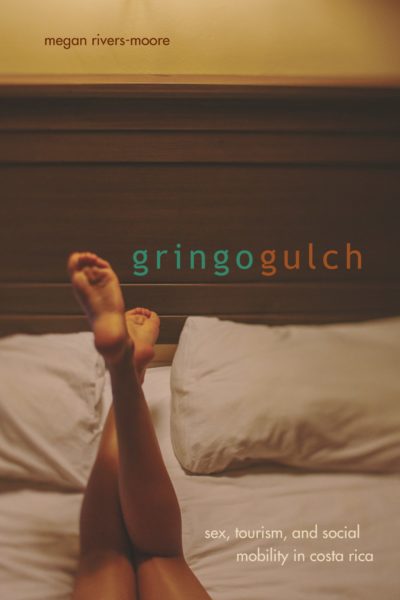Photo Caption: Hotel Del Rey – The most popular sex tourism hotel in the Gringo Gulch neighbourhood.
In her newly released book, Gringo Gulch: Sex, Tourism, and Social Mobility in Costa Rica, Women’s and Gender Studies professor, Dr. Megan Rivers-Moore presents her extensive ethnographic research on the vast and complex sex industry that exists within the neighbourhood known as Gringo Gulch in Costa Rica’s capital city, San Jose.
“There are a lot of places in the world viewed as sex tourism hubs, but Costa Rica is unique for many reasons. For example, it’s proximity to the U.S. and the way the country has been marketed as safe, familiar, and affordable for travelers but also as “exotic” and different has made it especially appealing to many middle class and working class men from North America interested in participating in the sex industry,” said Rivers-Moore.
Professor Rivers-Moore attributes a number of factors to the booming market of sex tourism in Costa Rica. For one, the state does not regulate the exchange of money between sex worker and purchaser (though third party involvement such as managers or brothel administrators is illegal). While this lack of state intervention on the industry undeniably plays a massive role as to why sex tourists come to Costa Rica, Rivers-Moore’s research ascertains that, paramount to attracting sex migrants and tourists is the broad-minded social disposition towards the scene.
“From the perspective of the tourists, the state, and the sex-workers themselves, there exists an understanding as to why everybody is there and playing the role they are playing. Each of these players is profiting from the industry in one way or another, they are all using their participation to get ahead. And the stigma that surrounds sex-work in North America, particularly the turn toward criminalizing the sale of sex in many places, including in Canada most recently, is a major motivator for sex tourists who travel to Costa Rica. They are able to participate in the industry without risk of arrest and public shaming. Stigma for them isn’t a serious issue in Costa Rica, although it certainly is an issue for Costa Rican sex workers, who struggle to hide the source of their income from their families and communities.”

Dr. Megan Rivers-Moore
Rivers-Moore’s book actively challenges the narrative that most of us reflexively construct in our minds when presented with such a scenario – that the local sex workers of a Third World, Latin American country are being exploited and taken advantage of by privileged white, North American men.
Instead, Rivers Moore tells a more composite story of the Costa Rican sex tourism scene. “You quickly learn that we can’t presume to know what exactly is being bought and what is being sold. Often the exchanges have a lot more depth than the transaction of sex for money.”
“Many of the sex workers I interviewed articulated the idea that they viewed themselves also as care workers; believing they were providing a service to humbled white men who had run out of relationship options in their homeland. They took great pride in making these men feel good about themselves, and considered the caring aspects of their work (listening to men talk about their problems, making them feel attractive) was as important, if not more important, than the sex. Similarly, many of the men I met articulated that they view themselves as progressive and take a great deal of pride in treating the women they meet with respect in a culture they view as inherently misogynistic. This is a massive generalization about Costa Rican culture, of course, and one that is based on problematic assumptions and generalizations that are often pretty racist. But it’s significant that sex tourists want to think about themselves as enlightened and progressive, and some of them are well versed in feminism. Barry, a tourist from Virginia who took on a second job in order to fund periodic trips to Costa Rica, found it important to emphasize ‘I really appreciate them. I’m really glad they’re here, for me they’re a godsend. I’m sure lots of men treat them badly, but I make sure to be kind, to be respectful.’”
“Given the nature of sex tourism, there was a lot of talk from both sex workers and their clients about getting the ‘girlfriend experience,’ an experience that involves longer periods of time together, talking, listening, and sharing interests. This work involves quite a lot of skill, requiring patience, compassion, and empathy. For example, Virginia, a mother of two who attends secondary school at night, told me ‘some of them just look for company, they pay for company. I’m very happy to listen, as long as they pay. I’ll listen to it all. Cry, whatever, as long as you pay.’ It is so much more complicated than just sex.”
Rivers-Moore has a long standing academic relationship with Costa Rica. Prof. Rivers-Moore became interested in the country when she moved there after completing high school to spend a year learning Spanish and she was quickly enchanted with the nation’s considerable charm.
It was during this time in Costa Rica that she first noticed the prevalence of male tourists, but due to the subtle nature of the sex industry, it took her some time to recognize the dynamic at play. Once she understood what was occurring, she became fascinated, and focused much of her post-secondary education and early academic career on this phenomenon. Rivers-Moore completed her PhD at the University of Cambridge and upon completion of her degree, she went on to work at the University of Costa Rica, where she continued her research on a more long term basis before accepting a job at Carleton University.
This thorough Costa Rican research journey has ultimately led to the release of Gringo Gulch: Sex, Tourism, and Social Mobility in Costa Rica, an ethnographic work that analyzes and decodes the mosaic of race, gender, class, government, and human need and desire in our increasingly borderless world. For Gringo Gulch, Rivers-Moore spent over a year in San José’s sex tourism neighbourhood, interviewing tourists, actors of the state, and sex workers to achieve a vivid depiction of what being a player in this game is comprised of. The reader is introduced to a variety of characters from all sides who give their honest account as to why and/or how they participate in the Gringo Gulch scene, and what is taken away from it. “People sometimes assume that sex work is about villains and victims, and I think my work demonstrates that nothing could be further from the truth. It is so important to actually do empirical research and talk to people about their lives, because when we do, we find out that the sex industry is so many things simultaneously: it can be fun, it can be boring. Some people have harrowing experiences, and some find it utterly mundane. I really can’t emphasize enough how important it is to listen to people’s own interpretations of their lives and their experiences, without judgment.”
What Rivers-Moore is able to conclude from these characters is that most involved – the sex workers, the sex tourists and workers of the state – embrace the industry for their own sake, and use it to climb a social and/or monetary ladder that likely wouldn’t have been accessible to them without the existence of sex tourism.
By setting the scene in the culture of pura vida and telling us these distinctive stories of individuals (which are sometimes tragic, sometimes empowering and sometimes both), Gringo Gulch: Sex, Tourism, and Social Mobility in Costa Rica is an account of a nuanced social manifestation that helps us to understand the transnational ramifications of sex tourism. On an even broader scale, Gringo Gulch is the analysis of human beings making the most of their own disparate realities in a neoliberal state.
Gringo Gulch: Sex, Tourism, and Social Mobility in Costa Rica has been published by the University of Chicago Press.

The post Gringo Gulch: Sex, Tourism, and Social Mobility in Costa Rica appeared first on Faculty of Arts and Social Sciences.
Monday, October 17, 2016 | Categories: Book Launch



